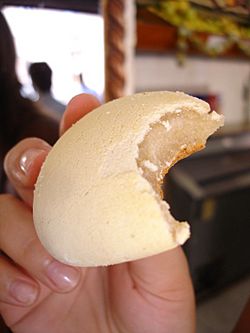Pandebono facts for kids

Pandebono Cartagenero
|
|
| Type | Bread |
|---|---|
| Course | Snack |
| Place of origin | Colombia |
| Region or state | South America |
| Associated national cuisine | Colombia |
| Serving temperature | Hot or room temperature |
Pandebono or pan de bono is a yummy type of Colombian bread. It's made from cassava starch, which comes from a root vegetable. It also has cheese and eggs. Sometimes, people even add guava jam!
This bread is often eaten warm, right after it's baked. Many people enjoy it with a cup of hot chocolate. Pandebono is super popular in a part of Colombia called Valle del Cauca. You can find it in two shapes: round or like a ring. It's a favorite snack for many!
Contents
What's in Pandebono?
Pandebono gets its special taste from a few key ingredients. The main one is cassava starch. This is a fine powder made from the cassava root, which is a plant grown in warm places. It gives the bread a unique, slightly chewy texture.
Besides cassava starch, Pandebono also has lots of cheese. This makes it savory and delicious. Eggs help to bind everything together and make the bread soft. In some areas of Colombia, people add sweet guava jam inside. This creates a tasty mix of sweet and savory flavors.
Where Does the Name Pandebono Come From?
The name "Pandebono" has a few interesting stories behind it. Here are some of the most popular ideas:
The Italian Baker's Story
One story says that an Italian baker lived in the city of Cali, Colombia. Every afternoon, he would bake this special bread. Then, he would go out into the streets to sell it. He would shout "pane del buono!" which means "good bread" in Italian. People started calling the bread "Pandebono" because of this baker's calls.
The "El Bono" Farm Story
Another idea comes from a place called "Hacienda El Bono." This was a farm located on the road between Dagua and Cali. It's said that this bread was first made at this farm. People who bought the bread would say "Pan del Bono," meaning "bread from El Bono." Over time, this name became shorter and turned into "Pandebono."
The Voucher Bread Story
A third story suggests the name comes from a "bono," which is a Spanish word for a voucher or coupon. Workers on sugar cane farms in the region sometimes received these vouchers. They could exchange them for bread. So, the name "Pandebono" might mean "voucher bread."
See also
 In Spanish: Pandebono para niños
In Spanish: Pandebono para niños
 | Stephanie Wilson |
 | Charles Bolden |
 | Ronald McNair |
 | Frederick D. Gregory |

